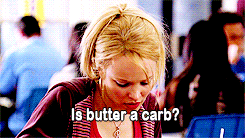The human body is a machine; in fact, it is the most incredible tool we will ever have, and to get the most out of ourselves, proper fueling is critically important. One of the best ways to keep our bodies moving is through consuming macronutrients: fats, carbohydrates, and proteins. These three macronutrients are all vital to help our bodies thrive.
1. Fats

Gif courtesy of giphy.com
Including fats in any diet is extremely important. However, there are different types of fats, some which are better than others. Fat is an unfairly stigmatized macronutrient. Consuming the right kinds of fat will not make you gain weight – rather, it can actually be a pivotal player in helping you lose weight and excess body fat.
The consumption of proper fats can help regulate your cholesterol, prevent against stroke and heart disease, promote healthy brain function, and maintain healthy skin and nails. The best part? The healthiest fats you can add to your diet come from great sources.
Try to incorporate Omega-3s and 6s, which come from a plethora of seafood (salmon, cod, halibut, oysters, among others) and monounsaturated fats, commonly found in avocados, (so yes, a big serving of guac too) olives, and nuts.
2. Carbs

Gif courtesy of giphy.com
Carbs are another of the key three macronutrients, and they’re much maligned. Carbohydrates provide the energy that our cells, and thus bodies, need to perform work. Getting the right amount of proper carbohydrates is critical for maintaining an optimal metabolism, and is great for post-workout recovery.
However, it is important to eat carbohydrates that are as close to their natural form as possible. Complex carbs and whole grains are the route to go – avoid bleached or enriched flour, as our bodies primarily digest that as sugar, not something we want an excess of. When we digest sugar, our bodies release insulin (a fat-producing hormone) which can have negative results.
3. Protein

Gif courtesy of giphy.com
It is a great misconception that protein is solely for muscle recovery and is intended to be used only post-workout. While protein is indeed great for building muscle, some other benefits include strong bones, improved sleep, and even weight loss.
Meat is usually the most-cited source for protein, but for those vegetarians out there, try yogurt or eggs (fish, too, if you don’t count that). Vegans can find good sources of protein in lentils and black beans. Another option is protein powder. Protein powder is easily digestible, great for muscle building and total body recovery, and open to omnivores, carnivores, and herbivores (as long as you get the vegan version).


